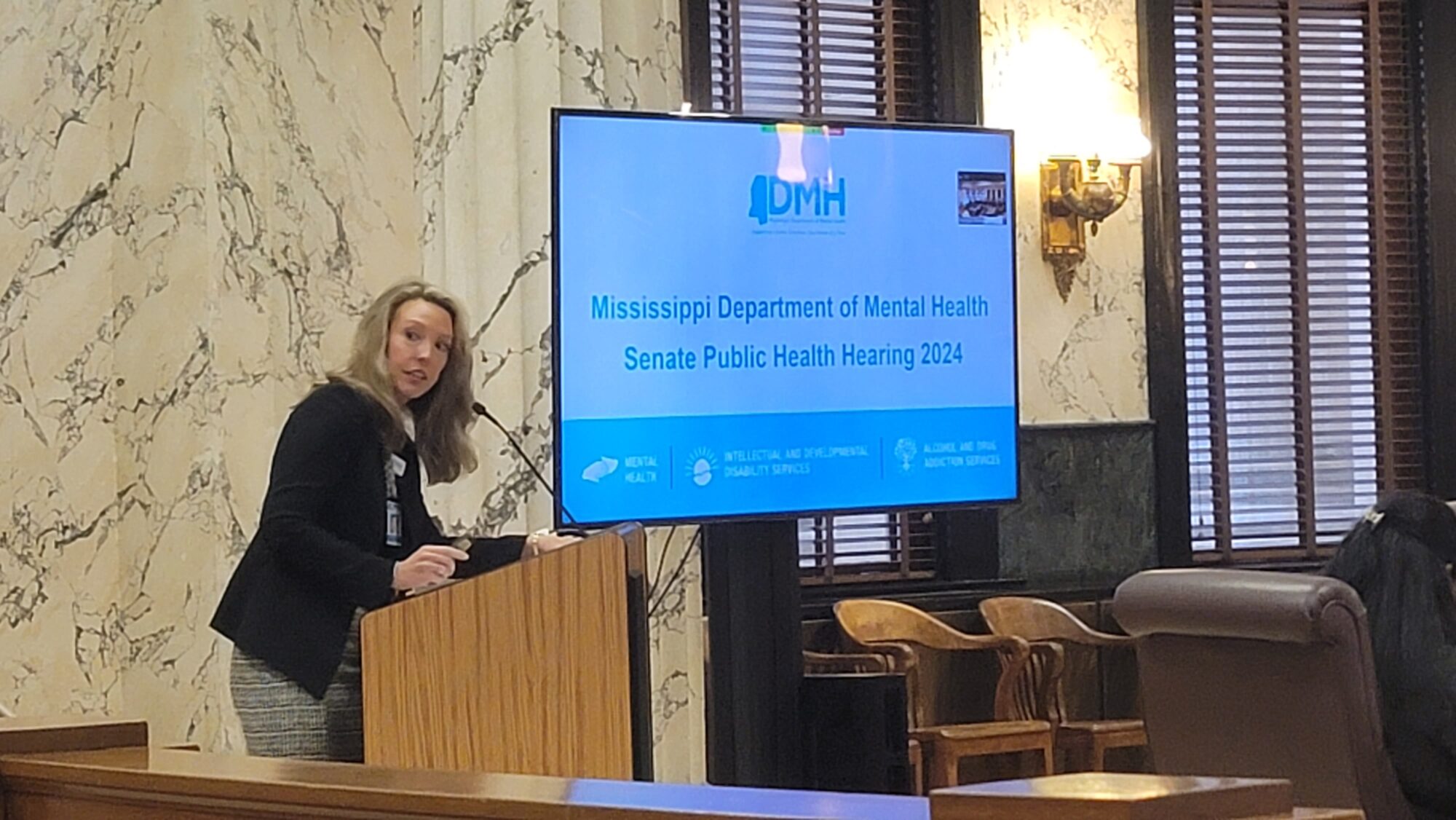
Wendy Bailey, Executive Director of the Mississippi Department of Public Health, gives a presentation to the Senate Committee of Public Health and Welfare during a hearing held Wednesday afternoon, Jan. 26,2024. (Photo by Jeremy Pittari)
- Of the more than 72,000 people served by community mental health centers in the state, about 23,000 were younger than 18 years of age.
The state Senate’s Study Group on Women, Children and Families recently heard from the executive director of the Mississippi Department of Mental Health about how the state is working to meet the mental health care needs of the state’s women and children.
Services through the Department of Mental Health
DMH Executive Director Wendy Bailey told legislators that of the more than 72,000 people served by community mental health centers in the state, about 23,000 were younger than 18 years of age.
In Mississippi, there are 125 providers certified by the Mississippi Department of Mental Health, of which 11 are Community Mental Health Centers. The others are privately owned and operated. Of those state-certified providers, 46 offer services to children and youth, but only 34 of the 46 provide all of the core services offered by CMHCs, Bailey said.
Those core services are outpatient therapy, community support services, psychiatric/physician services, crisis response, pre-evaluation screening, peer support services, and day treatment.
In order for the treatment to be successful, Bailey told the Study Group that a person needs to have a number of basic needs met first.
“I really want to drive home the point that the success of women and children and families in our state is dependent upon their overall health and social determinant of health,” Bailey described. “It’s not just mental health, which makes study groups like this so important. That you’re looking at the big picture and not just one item.”
Bailey suggested the Senate Study Group focus on addressing the overall health factors, such as social and economic, physical environment, clinical care, behavioral health, and physical health.
“It’s just important to remember that the health of the citizens in the state is dependent upon their education, their access to healthy foods, their access to healthcare, to transportation, safe housing, economic stability, all of those things are interconnected,” Bailey said.
Substance abuse in pregnant, postpartum women
When it comes to rates of substance disorders, Bailey said the state has lower rates for youth, but as Mississippians age the rate rises above the regional average. For children 12 to 18, the national average of substance disorders is 9 percent compared to the regional average of 8.3 percent. Mississippi’s average is 7.7 percent. Statistics for those 18 and older show the national average is 17.8 percent, while the regional average is 15.9. Mississippi’s average is 16.8 percent.
Substance abuse disorders are especially worrisome when cases occur within pregnant women, she said.
“This statistic is startling to me,” Bailey added. “In the United States, 22.7 percent of all deaths that are pregnancy related are due to substance use or mental health.”
Bailey clarified that those deaths could be related to suicide, a drug overdose or strictly due to substance abuse. She said it’s estimated that one in every five women nationwide had a mental health condition during their pregnancy and postpartum time.
“Being screened and connected to treatment during the pregnancy is vital for the success and the health of the mom and the child,” Bailey stated.
State Senator Brice Wiggins (R) asked Bailey why she believes substance disorders increase as Mississippians age into adulthood. Bailey speculated that the current lack of screenings in young people play a part. She suggested putting a system in place where children are screened while in school by on-site therapists, connecting children with the proper treatment.
The referral process for pregnant women found to be using illicit drugs also needs to be addressed, Bailey said. She noted that illicit drug use by women in Mississippi aged 18 to 49 is ranked 30th in the nation, which includes the misuse of prescriptions as well as the use of cocaine, heroin, hallucinogens, inhalants and methamphetamine.
Bailey provided statistics from 2019 to 2023 that showed there is a growing number of pregnant or postpartum women in need of substance disorder treatment while the total number of pregnant and postpartum women is decreasing. In 2019, of the 34,466 pregnant or postpartum mothers in the state, 736 needed substance disorder treatment. The most recent data from 2023 showed there were 30,486 mothers who were pregnant or postpartum, and of that total, 857 needed substance treatment.
“The way that’s determined is by substances being in the infant’s system or the mother’s system when the baby is born,” Bailey elaborated.
To help with this problem, CMHCs and other DMH certified/funded providers prioritize care for those women and IV drug users through the 11 CHMCs or other certified centers.
The Child Abuse Prevention and Treatment Act (CARA) passed in 2018 mandated that when Child Protective Services receives a notification from an OBGYN that a woman or her baby has illicit drugs in their system, DMH is also notified so the patient can be connected with services. However, despite the act’s passage, Bailey presented statistics that showed referrals to CPS dropped, from 573 in 2022 to 272 in 2023.
“A very big drop from the previous year,” Bailey noted. “And we know substance use disorders are on the rise so, there’s some breakdown with the referrals.”
In response, Bailey said it’s now a priority of her office to work with CPS to ensure the referrals come in and those women receive the treatment they need.











